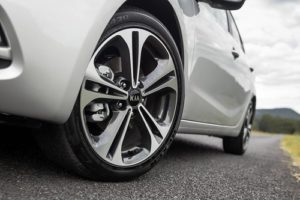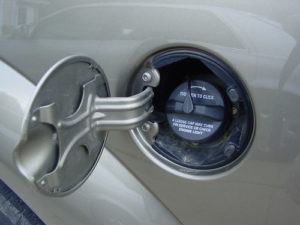The fuel efficiency of your vehicle has a significant impact on your car ownership costs. As fuel prices remain high, you may want to find ways to stretch a tank of gas a little further so that you can reduce your monthly expenses. This is especially important if you’ve been driving the same vehicle for more than eight years as older cars tend to consume more gas than newer ones. Follow these helpful tips to improve your gas mileage and save money:
Properly Inflate Your Tires

Image via Flickr by The National Roads and Motorists’ Association
Inflating your tires only when they look low is one of the habits that can make your vehicle less fuel-efficient. Even if your tires appear to be fully inflated, they may be slightly low, which can considerably reduce your gas mileage. Basically, if you have underinflated tires, your engine has to work harder and use more fuel to move your car.
To help your vehicle achieve maximum efficiency, you have to inflate your tires to the recommended pressure level listed in your owner’s manual. This can translate to substantial savings over the long run. Generally, each tire that’s underinflated by 10 PSI can cost you 5 mpg or more. Also, note that your tires will lose pressure more quickly in cold temperatures, so you need to pump them up more often during winter.
Use the Right Type of Engine Oil
Avoid assuming that any type of engine oil will work for your vehicle. Your car’s engine is designed to perform best with a certain type of motor oil. If you use an engine oil that’s heavier than the recommended type, it can cause your engine to experience more friction and strain, which can undermine its fuel economy.
Read your owner’s manual to find out the recommended motor oil for your car and use only that specific type of oil. Alternatively, you can go to a reputable service center for routine oil changes. Such a facility has well-trained and experienced technicians who know what type of engine oil is best for your specific car make and model.
Replace Your Air Filter and Spark Plugs
The air filter serves the important function of preventing dirt, debris, and other particles from getting inside the engine and potentially causing damage. If it’s dirty or clogged, it can reduce airflow to the engine, resulting in sluggish acceleration and poorer fuel efficiency. Additionally, it may change the engine’s air-fuel balance and pollute the spark plugs. Bad spark plugs can prevent the engine from operating smoothly and cause it to burn more fuel.
Replacing your air filter and spark plugs on a regular basis not only extends the life of your vehicle, but it can also increase your gas mileage. It’s an inexpensive maintenance task that can save you a lot of money down the road.
Check Your Gas Cap

Image via Flickr by TireZoo
Your vehicle’s gas cap has a rubber seal that will break down after some time, allowing outside air to leak into the fuel tank. Consequently, an excessive amount of air will enter the engine when it pulls gas from the tank, leading to an increase in fuel consumption.
For most vehicles, replacing the gas cap is easy and doesn’t cost a lot. You should do this once every few years to ensure your vehicle will always have a gas cap with a tight seal. It’s recommended that you get a genuine factory gas cap from your local dealership that perfectly fits your car. If your vehicle is relatively new, it may have a sensor that detects a bad seal on the gas cap. Usually, this sensor can only recognize an original equipment manufacturer part.
Avoid Exceeding the Speed Limit
Besides properly maintaining your vehicle, you can also develop certain driving habits to get better gas mileage. One of these habits is driving at or below the speed limit. Most vehicles burn fuel less efficiently when they’re traveling at a speed of 60 mph or higher. The optimal speed for fuel efficiency may vary from one vehicle to another, but it typically doesn’t exceed 60 mph.
Driving slower not only has an immediate impact on your car’s fuel economy, but it can also help you avoid costly speeding tickets. Furthermore, it greatly reduces your chances of getting into an accident.
Coast to Red Lights and Stop Signs
When you’re approaching a yellow traffic light halfway down the block, you won’t be able to get there in time even if you punch the gas pedal. On the other hand, if you fully release the accelerator and just coast to a stop, you’ll save yourself some fuel money. You can do the same thing when you’re coming to a stop sign, taking an exit ramp on the highway, or approaching a bend.
Bear in mind that hard acceleration before stopping causes your car to use more fuel. So, anytime you need to slow down or stop, try to coast instead of hitting the gas.
Get Rid of Excess Weight
Driving around with a lot of junk in your trunk can significantly lower your gas mileage. If you have a front-wheel-drive vehicle, putting additional weight on the rear axle can cause the front wheels to lose grip, resulting in poorer fuel economy. In addition, the extra weight also means that your engine needs to put in more effort to move your vehicle, which further reduces its efficiency.
If you have the habit of keeping unnecessary things in your car, removing them can help you save fuel. Also, it can make your car easier to drive and last longer.
One of the best ways to improve your vehicle’s fuel economy is to keep up with your regular maintenance schedule. If you’re looking for top-quality auto services in Corinth, Texas, consider taking your car to Huffines Kia Corinth. Our dealership has a state-of-the-art service center that provides all the maintenance services you need to keep your car running smoothly and efficiently, from oil changes to tire inspections. Feel free to contact us if you need more fuel-saving tips or want to make a service appointment.
